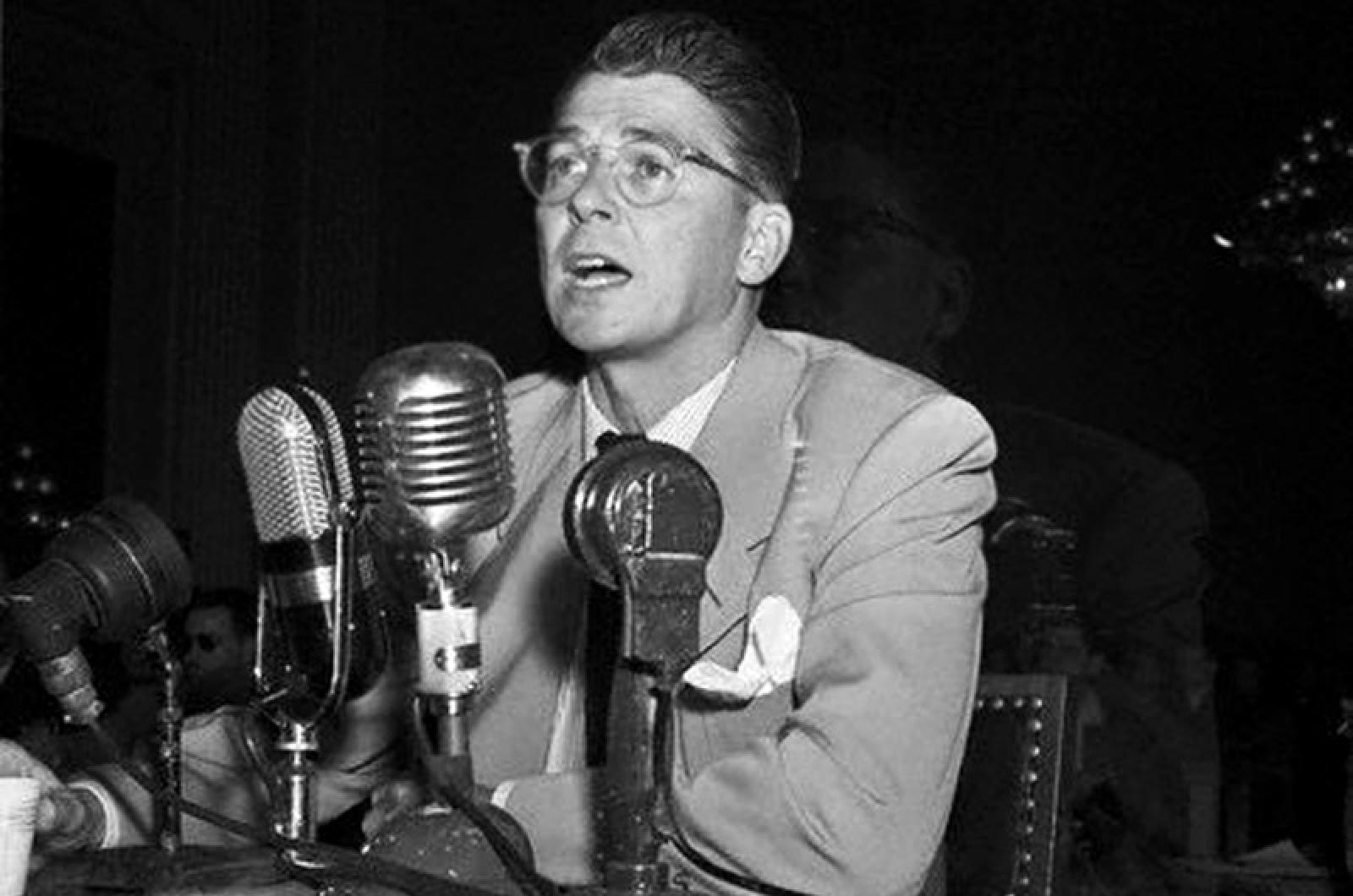In October 1947, the House Un-American Activities Committee (HUAC) decided the easiest way to grab headlines was to scare the country by implying Communists may be poisoning Hollywood’s movies. Imagine — while you’re sitting in the dark eating your popcorn and having your nerve endings tickled, you might also be having your brain washed. So Hollywood was asked to come to Washington to explain itself. Among the witnesses labeled “friendly” (to HUAC, that is), Ronald Reagan took the stand. As president of the Screen Actors Guild, he showed himself to be a good union boss and a patriotic one.
“. . . Fundamentally I would say in opposing those people [Communists] that the best thing to do is to make democracy work. In the Screen Actors Guild we make it work by insuring everyone of a vote and by keeping our members informed. And Jefferson put it a lot better than I can — if all the American people know all the facts they will never make a mistake,” Reagan, age 36, testified.
Almost sounds like a Democrat, no? That’s when Ronald Reagan was married to actress Jane Wyman. But when I spent three hours with him in a Los Angeles office in 1975, he was married to actress Nancy Davis and was sporting impeccable GOP credentials. I was part of a team making a film about those 1947 hearings and the blacklist period that followed (1947-1962). The film, called Hollywood on Trial, received a 1977 Oscar nomination for Best Documentary.
Including Reagan was perfect casting. At the height of the Red Scare as the head of SAG, he served as a conduit to the FBI for fearful actors looking to clear their names or point fingers at others to insure job security. He was publicly in denial about the existence of an actual blacklist where people who may or may not have been Reds ended up as unemployables if they did not cooperate with what many saw as a witch hunt.
When I reached out to him for an on-camera interview, he had just finished his eight years as the governor of California and there were many who felt his next step would be toward the White House. I knew I had to be delicate in my approach at wooing. Bringing up “blacklist” seemed counter-productive. I wrote to him that we were doing a film on the Cold War effect on the movie industry and strongly believed he was a natural expert.
Then my phone rang in Cambridge: “Hold please for Governor Reagan.” Was this a joke? Was some pal pulling my leg? Then that recognizable toast-and-coffee voice came on the phone. “I think this is a wonderful idea for a film. I would love to be interviewed on camera. Let me turn you over to my assistant and you can book a date.” Dumbfounded, I replied: “Don’t you want to meet me first and listen to what questions I’d like to go over?” Without missing a beat: “That’s a waste of your time and mine. I’ve had a career with cameras. Just come do the interview.”
So there we were — L.A., June 1975. I was with a film crew going up to the Wilshire Boulevard office of Michael Deaver, Reagan’s friend and soon-to-be deputy chief of staff. Governor Reagan, then 64, was waiting for us, shook everyone’s hand. A decent, pleasant person whose politics had nothing to do with mine. He was likeable. Nothing seemed phony. Then again, there were no gray hairs, which reminded me of a joke attributed to Gerry Ford: “Reagan doesn’t dye his hair. It’s just prematurely orange.”
He sat behind a desk. I sat in front of it, the camera behind me. Behind him were the flags of the United States and California. We rolled. A couple of times during the interview I stopped filming to correct him. He got a date wrong here, a name wrong there. He was appreciative. I wanted to show him we were not out to hang him. Politicians are very adept at doing that to themselves without any help.
He repeated there had been no formal blacklist promulgated by the studios. “That would be restraint of trade, a violation of federal law.” He explained the American public called the tune, threatened boycotts of movies with certain people associated with them, a threat to the studios’ bottom lines. Do I hear hairs being split? According to many others, there were lists on desks all over Hollywood — names of Reds, alleged Reds, sympathizers, civil rights activists, people at the wrong place at the wrong time. And one of those names was Nancy Davis.
Her screen career was just starting when she found herself, she told her union leader, to be on a blacklist. According to the SAG chief, there was another actress with a similar name who was the one in question. He offered to help rescue this damsel in distress. During the clearing of her name, they fell in love. They got married. His politics swung to the right. And the rest is history. A history that if we are not vigilant could easily repeat itself. After all, Reagan has left the building and we now live in the age of the Internet and Fox News where Americans can no longer agree on what a fact is.
Arnie Reisman and his wife, Paula Lyons, regularly appear on the weekly NPR comedy quiz show, Says You! He also writes for the Huffington Post.




Comments (1)
Comments
Comment policy »